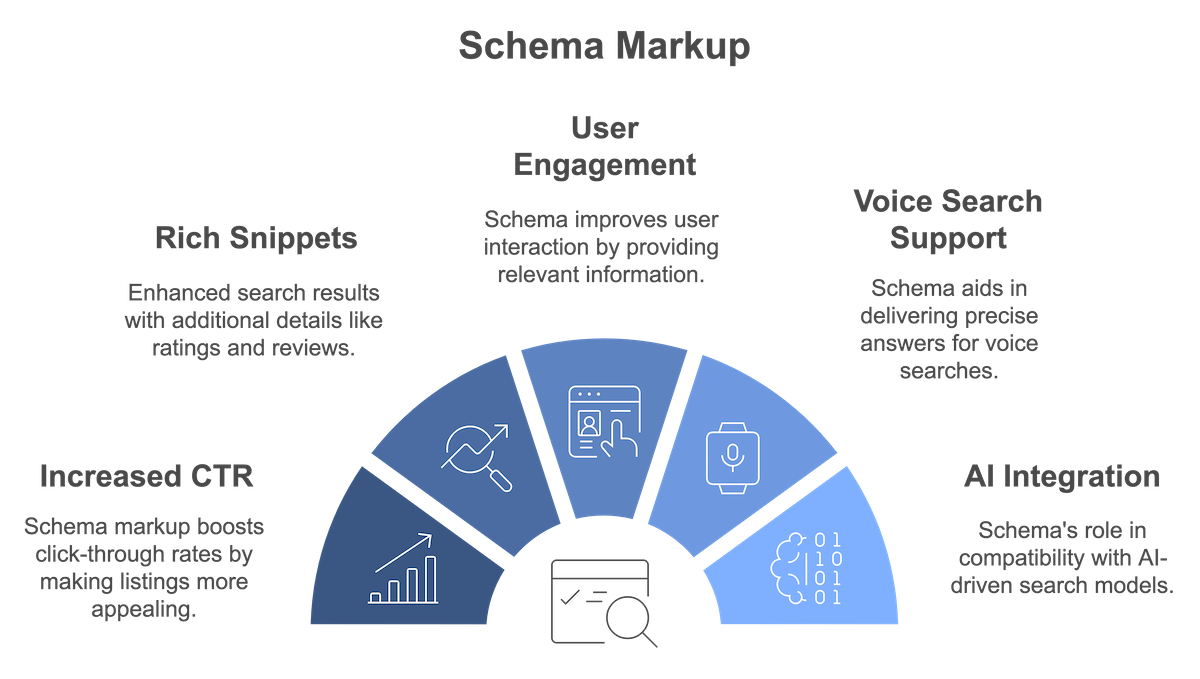Why Schema Markup is Critical for SEO Success
By: Hayden Jarman

Schema markup, a type of structured data, lets search engines understand the specific details on a page.
This additional clarity allows engines to present this information in search results as rich snippets, enhanced listings that often include extra details like ratings or reviews.
These rich snippets not only increase visibility but also engagement.
Key Data Points:
- Schema markup leads to a 40% increase in Click-Through Rates (CTR).
- 72.6% of top-ranking pages on Google use schema, showing its value among high-performing sites.
- 36.6% of search results now include rich snippets, due to schema’s structured data.
Why It Matters: Schema improves both visibility and user engagement in search results, making it essential for businesses seeking greater online reach and engagement.
Table of Contents:
- Core Concepts and Key Terms for Schema Markup
- Why Businesses Need Schema Markup
- Common Schema Markup Implementations
- Structured Data and Rich Snippets
- Emerging Trends in Schema and Structured Data
- Implementing Schema Markup on Your Website
- Challenges and Considerations for Schema Use
- Best Practices for Schema Optimization
- Future Prospects of Schema Markup
- Final Thoughts
🧠 Schema Smarts: Are You Ready for Rich Snippets? 📊
Test your knowledge of schema markup types and their purposes. Select the best answer for each question.
Core Concepts and Key Terms for Schema Markup
Understanding schema starts with knowing the different types of markup and how they benefit specific content types.
| Schema Type | Purpose |
|---|---|
| Organization | Provides details like address and logo for company pages |
| Local Business | Helps local businesses appear in location-based searches |
| Product | Includes product details like price and reviews |
| Event | Lists dates, times, and venues for events |
| FAQ | Displays questions and answers directly on search results |
| Review | Showcases user ratings to build credibility |
Examples:
- Local Business Schema enhances local SEO by giving search engines specific location data.
- Review Schema displays user ratings in search, offering instant social proof to potential customers.
Why Businesses Need Schema Markup
Schema provides real benefits, especially for businesses seeking a competitive edge in search rankings.
Top Reasons to Use Schema
- Increased Click-Through Rates: Sites using schema markup enjoy up to a 40% boost in CTR, capturing more user attention and clicks.
- Better Visibility with Rich Snippets: Schema data powers rich snippets, which are 72.6% more likely to appear on Google’s first page.
- Higher Engagement and Trust: Users tend to trust and engage with rich snippets, with 58% of users preferring these enhanced listings over standard results.
- Support for Voice Search: Schema helps provide direct answers, enhancing compatibility with voice-activated searches.
Common Schema Markup Implementations
Businesses commonly implement schema in ways that increase both visibility and click-through rates.
High-Impact Schema Types for SEO
- Breadcrumb Schema: Shows the page’s position within the site, aiding navigation.
- Article Schema: Optimizes blog posts and news articles, displaying key details like the title, author, and date.
- FAQ Schema: Highlights questions and answers on search pages, addressing common user queries.
- Product Schema: Features important product details such as price, availability, and user ratings.
| Schema Type | SEO Impact | Examples of Use |
|---|---|---|
| FAQ Schema | Increases engagement by answering questions instantly | FAQs on service or product pages |
| Product Schema | Boosts visibility with ratings and prices | E-commerce product listings |
| Review Schema | Builds trust by showcasing user ratings | Reviews on product and service pages |
| Local Business | Enhances local rankings through location-based data | Local business details like address and contact |
Learn more about optimizing content with schema at SEO Content Optimization Strategies.
Structured Data and Rich Snippets
Rich snippets are enhanced search results that include additional details drawn from structured data. These snippets make search listings more visually appealing and informative, which improves user engagement.
Why Rich Snippets Matter:
- Higher Engagement: Rich snippets provide quick answers, increasing the likelihood of user interaction.
- Improved CTR: Schema-powered snippets help listings stand out, significantly boosting click-through rates.
Dive deeper into creating high-performing content with Building Topical Authority.
Emerging Trends in Schema and Structured Data
Schema’s role is expanding in digital marketing, with new trends emphasizing its versatility:
- Voice Search Optimization: Schema plays a significant role in delivering precise answers for voice searches.
- E-A-T and Authority Markup: Google is increasingly focused on E-A-T (Expertise, Authoritativeness, Trustworthiness). Using Author and Publisher schema can support these factors.
- AI and Schema Integration: AI-driven search models rely on structured data, making schema essential for compatibility with emerging AI technologies.
For a closer look at improving SEO rankings, check out How to Use Google Search Console for SEO.
Implementing Schema Markup on Your Website
Using schema markup effectively involves selecting the right format and validating it properly.
Each format has unique benefits:
| Markup Format | Best Use Cases |
|---|---|
| JSON-LD | Recommended by Google, easy to embed into HTML |
| Microdata | Best for simple sites, integrated directly into HTML |
| RDFa | Great for HTML5, adds semantic structure |
Step-by-Step Schema Setup:
- Choose the Right Schema Type: Identify schema types like FAQ, Product, or Local Business based on content.
- Generate JSON-LD Code: Tools like Google’s Structured Data Markup Helper assist with code generation.
-
Insert into HTML: Embed JSON-LD code within the
<head>or<body>sections. - Test and Validate: Use Google’s Structured Data Testing Tool to ensure correct setup.
Challenges and Considerations for Schema Use
While schema markup brings substantial benefits, some challenges can affect its performance:
- Regular Testing: Schema should be validated regularly to ensure correct indexing by search engines.
- Schema Updates: New schema types emerge frequently, requiring consistent updates to stay competitive.
- Technical Skills: Implementing JSON-LD or other schema formats may need technical expertise.
Pro Tip: Use schema on high-traffic pages to maximize its impact. Try implementing it on essential service pages like SEO for Multiple Locations to boost local SEO.

Best Practices for Schema Optimization
Following schema best practices helps you get the most out of this powerful tool:
Essential Tips for Effective Schema Use
- Target High-Impact Pages: Start with the homepage, product pages, and blog posts.
- Use JSON-LD Format: Google recommends JSON-LD for its compatibility and ease of use.
- Validate and Update Regularly: Test schema after implementation and update it as content changes.
Example for FAQ Schema: Adding FAQ schema on popular pages increases engagement by showing answers directly on search results.
Explore how structured data helps improve SEO with Improve Lead Quality with SEO.
Future Prospects of Schema Markup
As search engines evolve, schema will continue to be a valuable tool in SEO strategy.
Google’s reliance on structured data for rich snippets and voice search answers means that schema’s role in search rankings will only grow.
| Future Trend | Description | SEO Impact |
|---|---|---|
| Voice Search Growth | Schema offers structured answers for voice search | Increases voice search positioning |
| AI Search Models | AI leverages schema for semantic understanding | Boosts schema’s importance for AI-driven results |
| Enhanced E-A-T Focus | Tags like author improve content credibility |
Boosts visibility and trustworthiness in search rankings |
Final Thoughts
Schema markup is indispensable for SEO. It enhances visibility, increases CTR, and supports emerging trends like voice search and AI-based content recognition.
For businesses eager to get ahead, implementing schema on key pages like Inbound Marketing for B2B or Improve Lead Quality with SEO can make a measurable difference.
By following these best practices, you’ll ensure your website benefits from schema’s potential, standing out in search results and attracting more user engagement.
Related Posts:
- Understanding Google’s Local Pack: How to Get Featured
- Google Business Profile FAQs: Everything You Need to Know
- The Best Google Ads Extensions to Boost Your Click-Through Rates
- How to Leverage Facebook Groups for Local Business Leads
- How to Use AI to Write Better Social Media Captions
- How to Optimize Google Reviews to Attract More Customers
- LinkedIn for B2B Marketing Success
- How to Conduct a Social Media Audit (w/ "Audit Readiness" Quiz!)
- Creating a Content Calendar for Consistent Posting
- The Importance of Mobile Optimization in 2024
- Data Privacy Regulations: What Marketers Need to Know
- The Role of Chatbots in Enhancing Customer Service
- SEO for Small Business: The Ultimate Guide to Getting Found Online
- The Role of Keyword Clustering in Modern SEO

